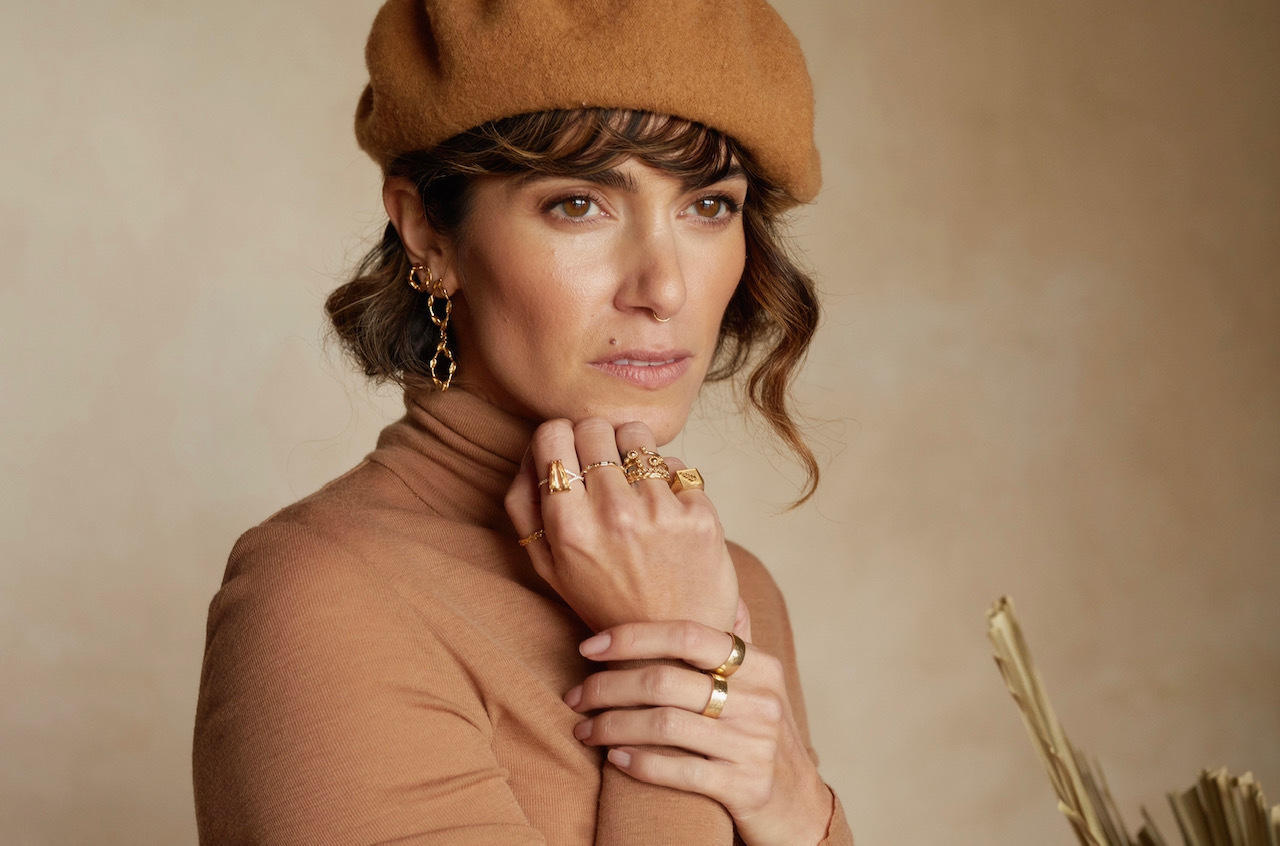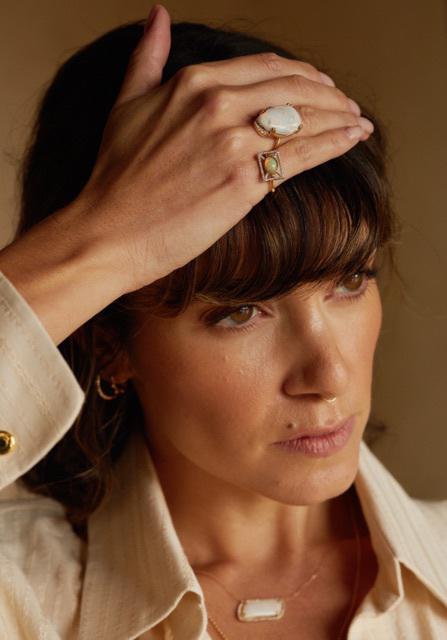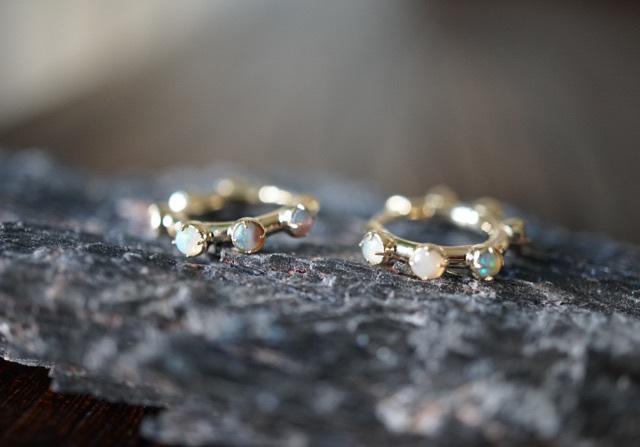
Whether it’s through her oft-groundbreaking and shapeshifting film roles or her eco-conscious brand, Nikki Reed affects change. In 2003, Reed blasted onto the scene by co-writing and starring in the seminal teen drama, Thirteen, opposite Evan Rachel Wood. It was her groundbreaking performance in the Catherine Hardwicke-directed debut that led to numerous other roles, including Kathy Alva in 2005’s Lords of Dogtown and Rosalie Hale in Twilight. In 2017, Reed co-founded a sustainable lifestyle brand, Bayou With Love, with Morgan Bogle, which ardently works toward “a zero waste model with the smallest footprint possible.” Our editors, Alexandra Julienne and Emma Reese, recently caught up with Nikki to talk sustainability, Thirteen’s legacy, and the importance of women creating their own opportunities.
AJ: A generation of women came of age watching movies like Thirteen and Twilight in the 2000s. Both were collaborations between you and your director and long-time friend, Catherine Hardwicke, though particularly the former, which you co-wrote with Catherine based on your own experiences. What impact has her mentorship and friendship had on you both then and now?
NR: The role Catherine has played in both my personal and professional life has definitely impacted and shaped who I am, particularly my desire to uplift, mentor, and support young girls. I have undoubtedly taken this on as an area of personal passion because I know firsthand what it feels like to have another woman – apart from your mother – believe in you. Catherine is a powerhouse. She won’t take no for an answer, and in an industry that was, and in many ways still is, male-dominated, she has created every opportunity for herself. I think what I love most about Catherine is her commitment to helping young women pursue their dreams. The domino effect that it has is unmistakable.
AJ: Did collaborating with a female director at the start of your career affect how you chose projects down the road?
NR: To be honest, I worked out of necessity. It isn’t something that I have spoken about often, but had I had the luxury and opportunity to be selective, I probably wouldn’t have made a lot of the career choices I had to make in between the films that I am proud of like Thirteen, Lords of Dogtown, and the Twilight series. But my path was unconventional. I moved out when I was just 16 years old. I had to pay the bills and grow up super fast, so I worked because I needed to work, and I learned a lot along the way. I don’t regret working on any of the projects that I did because it taught me so much about life. It was character building in that it taught me from a young age how to work hard, pay bills, and survive. That said, working with a female director early on in my career definitely set the bar high, and made me aspire to be more and do more. I always knew that I would create, direct, and continue to write because I was surrounded by powerful women who didn’t allow gender bias to discourage them.
“I believe that women will always see better opportunities when they create for themselves and for each other. I have never had opportunities handed to me, so I learned from a young age that I would have to work very hard for anything that I wanted.”
ER: You have been self-starting projects from a very young age. How important do you think it is for women to create their own opportunities rather than to wait for them?
NR: Personally, I believe that women will always see better opportunities when they create for themselves and for each other. I have never had opportunities handed to me, so I learned from a young age that I would have to work very hard for anything that I wanted. It also inspires me to wear many hats, which as a business owner has been quite helpful. I believe that women are multifaceted, dynamic beings that should never feel that they have to limit themselves to just one area of passion!
AJ: Thirteen, in particular, showed the darker realities of female adolescence at a time when the film industry was mostly turning out teen soaps and movies like Mean Girls (no shade to Mean Girls!) It strikes me that shows like HBO’s Euphoria are charging onward in a similar spirit on a larger scale. In what ways did telling your story both behind and in front of the camera impact you personally? Professionally?
NR: Thirteen changed my life forever. Putting my life and my family’s life out there for the world to dissect was unknowingly one of the scariest things ever, and I was only 13 at the time. It also impacted my family in ways that I could have never predicted. While it was based on my experience as a teenager, it was still written from the POV of a teenager, meaning that there were more sides of the story to be told. The father character, for example, was very one-dimensional in that we never explored how and why he was not as involved in Tracy’s life as she had hoped. Real people have layers and experiences and reasons for why they make the decisions that they do and at just 13 years old, I couldn’t see or write about that. I wrote only what I knew and what I could comprehend at that age. So if I tried to write that story now, it would have much more compassion for the characters who were doing the best that they could with the tools that they had. I am so sensitive to my family’s privacy now as a result of this experience, because none of us could have predicted the amount of pain that it would cause my family down the line, once the film saw success and everyone’s life was affected as a result. People were incredibly critical of my family, and I was only a kid at the time, feeling a tremendous amount of regret for opening the doors of our home for the world to talk about. I didn’t and couldn’t have known, but I still feel a responsibility now to take ownership of how deeply it affected those around me.
Inversely, that film changed the lives of so many and for that I am incredibly moved and proud. It created a safe space for parents to connect with their kids in ways that they could have never imagined, and to this day women come up to me and thank me for telling a story that allowed them to share theirs. I’ve been told that the film is required training material for certain professionals, especially for those who work with children or in areas of therapy and psychotherapy. And again, I could have never predicted the impact that it would have in that regard either. It is a powerful film, and a moment in time that I leave in a locked box in my heart. I know it’s there, I appreciate it more than I can put into words, but I am very protective over it because it is so personal.


ER: What advice would you give to young women who share those realities?
NR: I would tell them that they are not alone, and that it gets better. Being a teenager is so hard. It’s hard for everyone, but I do believe that it is particularly hard for girls. There is so much pressure to be what we see, so I would tell young girls to try and see outside of what the media and Instagram are projecting. Seek out women to idolize who are doing interesting things with their lives, and try not to obsess over what you look like, but rather who you want to become. Read books and get rid of your iPhone, write letters instead of texts, volunteer, and know that you can be anything you want to be as long as you work hard and stay kind.
AJ: While rewatching your Thirteen reunion with Refinery29 a couple years back, I found myself nodding along and smiling when your co-star Evan Rachel Wood admits that the storyline between Tracy and Evie played some role in her figuring out her sexuality. As a queer woman born in the early 90s, I have to ask: have you heard similar sentiments from fans of the film in the years since its release?
NR: I love Evan and I especially love her for her honesty, and when she told me that I was equally touched and totally blushed too! I had no idea that I was a part of such a powerful moment in her life as well, and now that we’ve reconnected and become quite close as adults and moms, it’s fun to relive and share our experiences and personal journeys with each other. To answer your question, yes, I do hear that from time to time. I often hear stories of how Thirteen helped girls connect on a deeper level with themselves, and their parents, and I think the storyline between Tracy and Evie – their admiration and “first love” feelings for each other – is definitely a part of what resonated with a lot of the girls who felt connected to the film.
AJ. In recent years, particularly with developments in social media and the internet, there’s been a new wave of female-founded and female-driven businesses. Women, more than ever, are creating products (and leading workforces) with other women in mind. Your jewelry brand, Bayou With Love, would seem to be a part of this change. What was the driving force behind your decision to create Bayou With Love?
NR: Thank you, that’s very kind of you. I wanted to build a company that focused on creating products that are as beautiful in their meaning as they are on the body. I like working with gold because it is a natural element and an heirloom that is treasured as it is passed down from generation to generation. When focusing on sustainability, I think we have to focus on slower production and fewer products, with larger meaning. We need to think about the lifetime of a product, as well as the story that comes with that product. What we wear and what we consume carries energy with it, and with fast fashion taking over the world, we have lost sight of that. I hope to inspire people to bring sustainability into their homes, and Bayou With Love is a great conversation starter that will hopefully lead to a more conscious lifestyle overall.
ER: What wisdom would you impart upon women, of all ages, who are considering making the jump into entrepreneurship or starting their own independent business?
NR: My advice would be this: learn to do it all! It doesn’t mean that you need to do it all forever, but it is so important to understand every aspect of your company. Find your passion, build your brand with authenticity and meaning, and then learn how to operate, create, and everything in between. I oversee all financial aspects of Bayou, I design every piece, I sketch, I build out the backend of the site like product pages, I do web/product photography, I oversee logistics, I am at my factory weekly, and everything in between. It’s hard, but I am grateful for the amount that I have learned, and I know that I wouldn’t have it any other way.
AJ: Something that strikes me as a commonality in both your acting and your jewelry design is a sense of naturalism and a lack of pretension. Bayou With Love seems like an obvious continuation of that with its emphasis on the beauty to be found in sustainability and the natural world. A lot of brands are marketing themselves as sustainable, but very few are actually committing to it. Bayou With Love seems to be among those fashion and beauty companies leading the way. What does sustainability mean to you in 2020?
“What does sustainability mean to me in 2020? It means that sustainable isn’t enough. Regenerative business – that’s the future.”
NR: Thank you so much, wow, that is such a huge compliment. I am a lifelong student, constantly learning better ways to operate and pushing myself and the team to find new avenues for a more sustainable future in fashion and beyond. What does sustainability mean to me in 2020? It means that sustainable isn’t enough. Regenerative business – that’s the future. I have been taking time to regroup and approach Bayou again looking through that lens. Being carbon neutral and striving for a circular economy is just the beginning. We need to think of ways to regenerate as we produce. Fashion brands must work with farms focused on biodiversity, we need to use cotton grown in healthy soil that prioritizes carbon sequestration, and this needs to be built into the DNA of our companies. My thinking cap is on, and big changes are coming for Bayou!
AJ: Do you think that sustainability as an ethic can actually generate more creativity, rather than be a restriction?
NR: I think that any challenge can be viewed as an opportunity to generate creativity! It’s only a restriction if you look at every door closing as a failure. Instead we need to get excited about the unknown and push ourselves to find areas where we can grow beyond that.